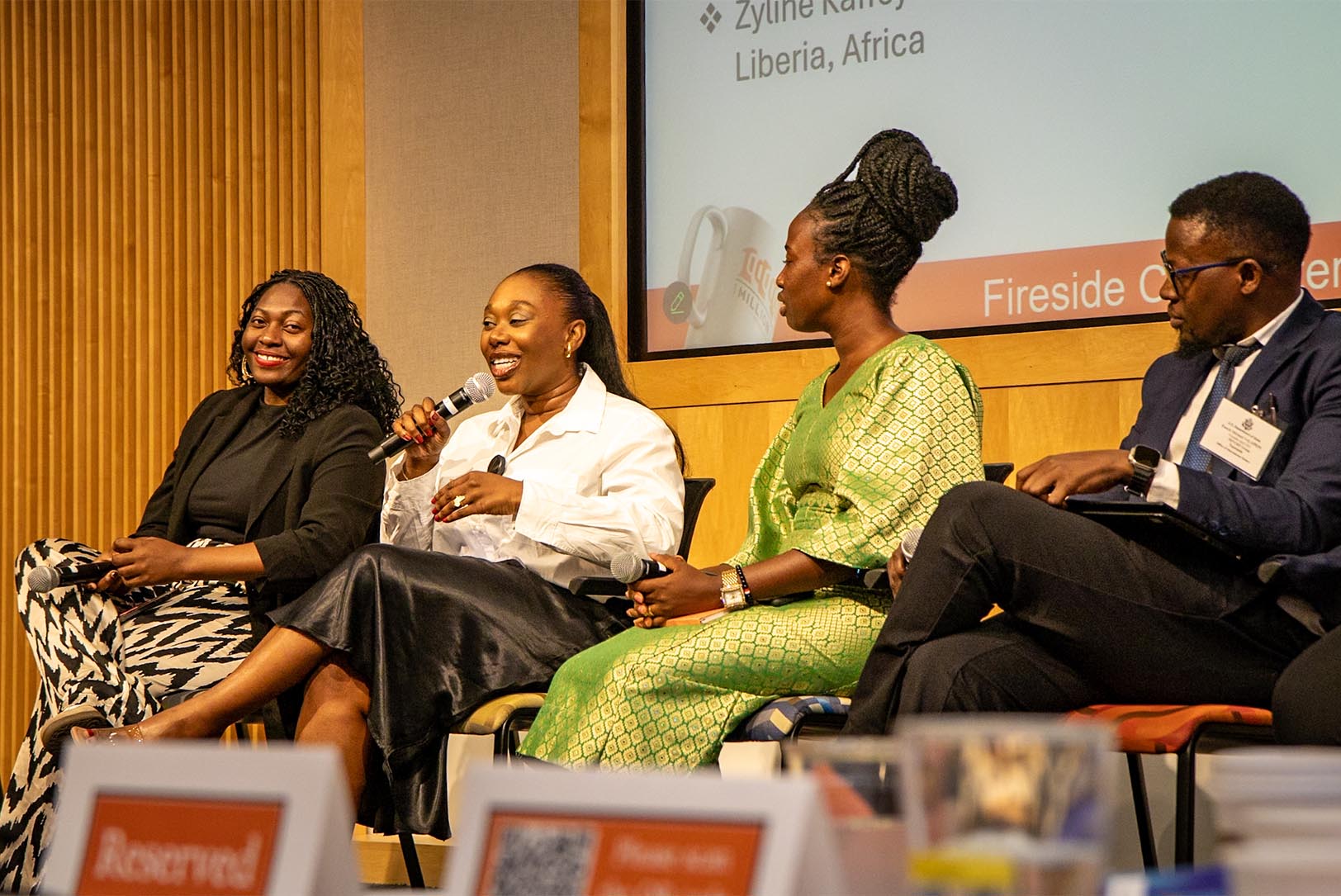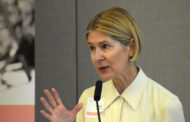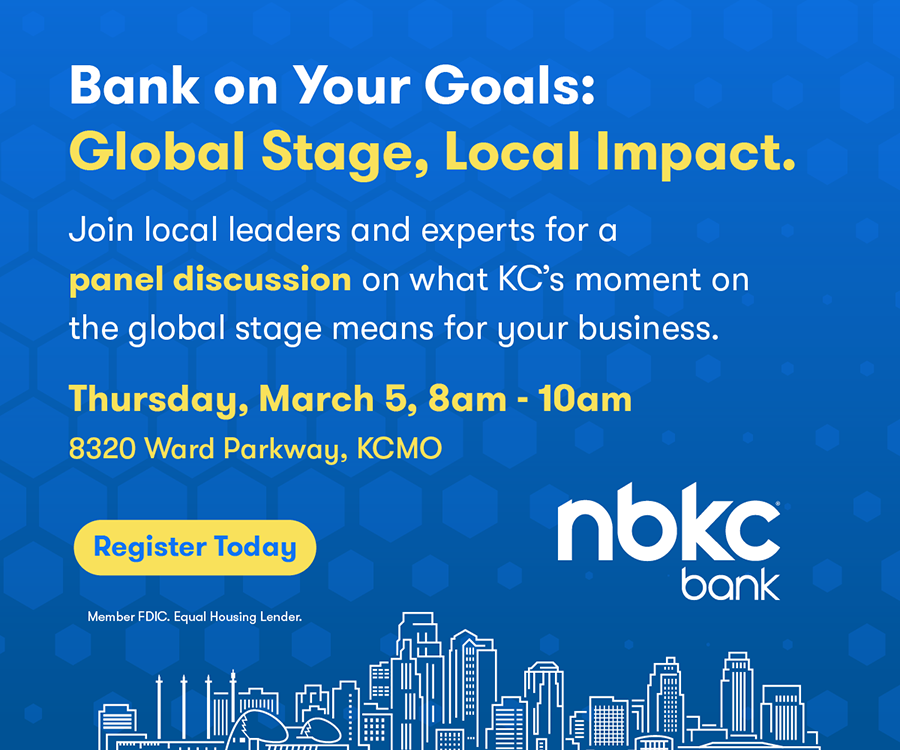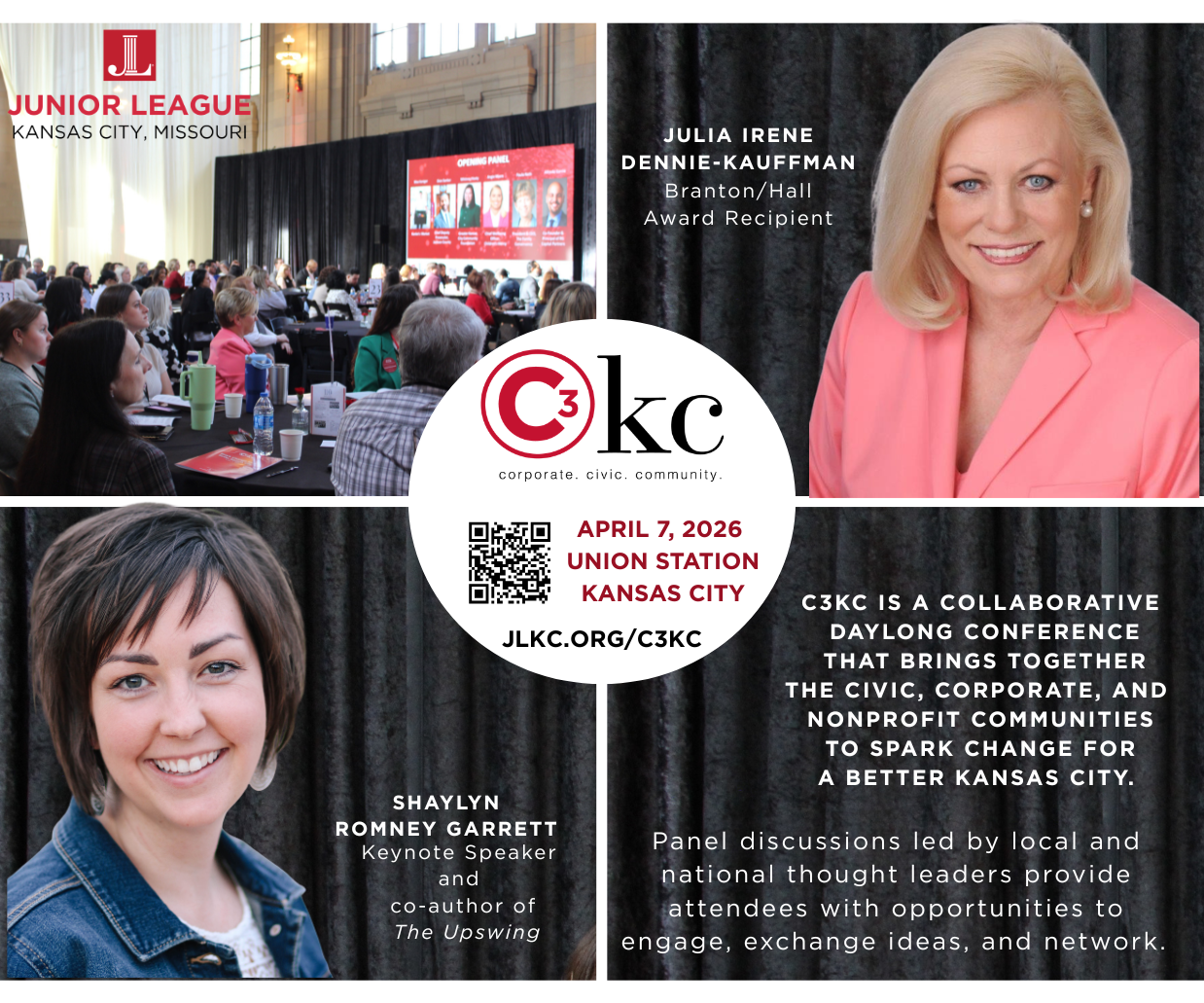The fail-fast mindset and high risk tolerance many American entrepreneurs employ in their quests to build unicorn startups are arguably foreign concepts to business builders on the other side of the globe, said Lucy-Llonna Larbi.
Her experiences in Germany reflect a slower, security-first focus, she said, expressing admiration for the American approach.
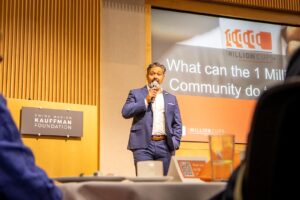
Kansas City entrepreneur Liderman Duin pitches his company, Toucan Talent, during 1 Million Cups Kansas City at the Ewing Marion Kauffman Foundation; photo by Haines Eason
“We think that Americans are very risky; they take risks. There’s a lot of high-risk capital,” said Larbi, a German entrepreneur and leadership expert selected for an international panel Wednesday during 1 Million Cups Kansas City — a supplement to the typical pitch event format — at the Ewing Marion Kauffman Foundation.
“If you haven’t failed at a company [in America], you’re not a real entrepreneur,” she continued. “In Germany, if you want high-risk capital, you need to go through 770 steps to get it.”
Across borders and time zones, entrepreneurs and ecosystem builders face many of the same challenges and questions, Larbi and her fellow panelists told the crowd for the special 1 Million Cups gathering.
How do we make entrepreneurship more inclusive? How do we move from ideas to products? And what does real support look like — not just at launch, but at scale?
How those far-flung change-makers respond to such obstacles and unknowns, however, can mean a world of difference from place to place, they said.
Bureaucratic boosts and bottlenecks
The panel of founders — participants in the U.S. State Department’s International Visitor Leadership Program hailing from Germany, Tunisia, Tanzania, Liberia, and Malawi — sat shoulder-to-shoulder at the Kauffman Foundation to compare notes on what it takes to build a business back home.
Each had been hand-selected by U.S. embassies in their respective countries for their leadership in economic development and brought to Kansas City through a partnership between Global Ties KC and the Kauffman Foundation; each eager to understand why U.S. entrepreneurs scale — or fail — faster.
From legal frameworks to mentorship funding, the panelists shared examples of how their home countries support startups — or, in some cases, how red tape slows progress before it begins.
In Tunisia, a grassroots push after the Jasmine Revolution helped create one of Africa’s first pieces of startup legislation, a government-supported legal framework to foster entrepreneurship.
“We were one of the first African countries that started bottom-up,” said Khaoula Behi, managing director of Tunisia’s Future Islands, an innovation lab.
“We put up this legal framework, the Startup Act, for entrepreneurs.”
Germany, meanwhile, has leaned into public funding initiatives.
“We have three things to highlight in Germany,” said Larbi. “We have our German Entrepreneurship Factory, which is now the new entrepreneurship system. We have the D-Hub Initiative, which is 25 locations with 25 focal points in Germany. One’s logistic, one is fintech, one is digital health — all provided by the government.
“And then on the international level, we have the GTAI, Germany Trade & Invest, where Germans go outside, abroad, and want to foster international trade and entrepreneurship.”
But bureaucracy remains the system’s Achilles’ heel, she said.
“Our biggest strength is also our weakness: We are very good at systems, but they make us very slow for entrepreneurship.”
That slow pace stands in stark contrast to the American model, panelists said.
“In the U.S., things move fast. You need something, you go for it and you get it,” said Enock Michael Salapion, founder of InnoPocket in Tanzania.
“Back home, to get a license might take a month,” he said. “In some countries, it might take a year.”
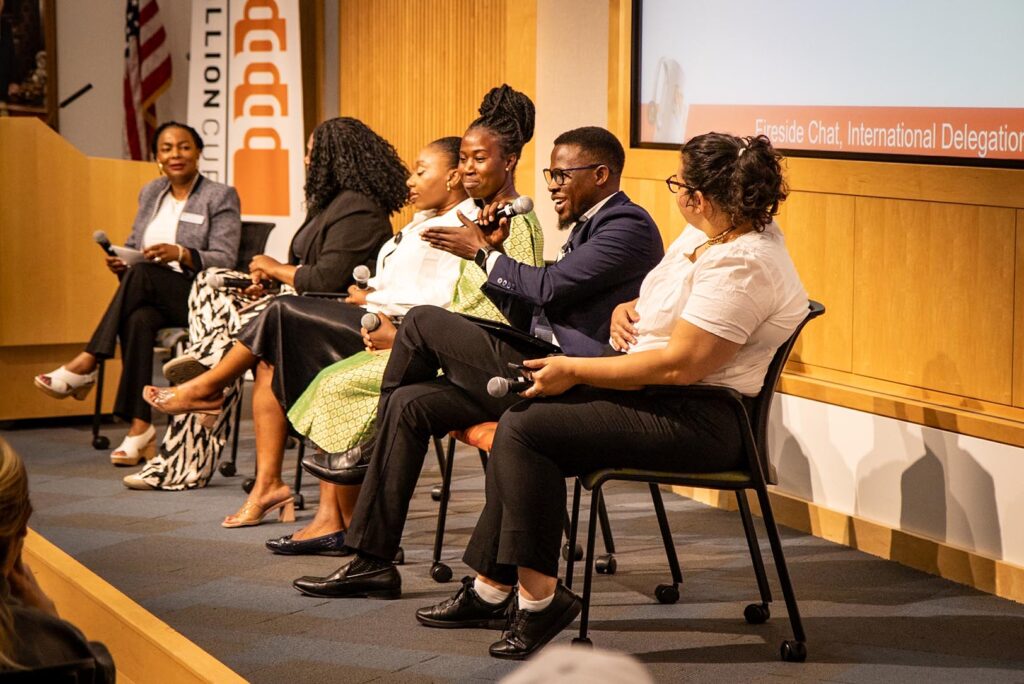
Enock Michael Salapion, founder of InnoPocket in Tanzania, speaks during a panel at 1 Million Cups Kansas City at the Ewing Marion Kauffman Foundation; photo by Haines Eason
Aligning priorities for scale
Several panelists emphasized that early-stage support — from pitch competitions to training — is abundant. But the gap between pitching an idea and launching a product remains a challenge to bridge.
“We have incubators and coaching,” said Behi. “But it gets ugly when you need to prototype. We stick to PowerPoint. We don’t go further than that.”
In Germany, Larbi said, students and even unemployed individuals can access grants just by filling out simple forms. But scaling those startups is another matter.
“But for us, the next step from the idea stage to the scaling stages, this is where it becomes more difficult, and this is where we have to model the U.S. a little bit more,” she said. “This is where entrepreneurship is a numbers game, it’s a connection and networking game, and this is where in Germany, our bureaucracy slows us down again.”
Liberia’s Zyline Kaffey Smith, founder of ZeeWash detergent company, said that the business ecosystem there “has not matured, so Liberians are still struggling.”
Challenges like limited access to markets and a lack of marketing skills or entrepreneurship education persist, she said.
But she and peers there are pushing back with “hands-on workshops, brand awareness (training) and mentorship.”
“We have been working with entrepreneurs to build a strong market where they can find trust and loyalty,” Smith said.
In Tanzania, Salapion described, a generational divide lingers wherein older adults still see tech as a threat to tradition.
“The biggest challenge that we have experienced is that there is a narrative, because technology came in later, so there is a narrative that there is a separation between this generation and people (in their) 80s, 70s, 60s, 50s — they still think that technology has come to destroy their culture,” he said. “So, embracing entrepreneurship through technology has been a challenge.”
On the flip side, seeing how technology is more freely adopted in the U.S., Salapion marveled at the concentration of high-growth startups even in secondary hubs.
“This morning I learned that all of Africa has fewer than 10 unicorns,” he said. “But a city like Charlotte, [North Carolina]? Charlotte alone has multiple unicorns. That is shocking.”
He said the difference also lies in policy alignment — particularly how U.S. government and private sector leaders seem to speak the same language.
“In some places, the people making policy have never started a business,” he said. “So they don’t understand what they’re trying to promote.”
Reflecting back the startup founder image
Building a startup-friendly culture for everyone — across gender, age, and class lines — proves to be a global challenge.
In Tunisia, Behi’s lab deliberately recruits women 35 and older, especially those with B2B experience, for tech and green economy roles.
In Germany, entrepreneurship has an image problem.
“The average entrepreneur is 36, white and male,” said Larbi. “At 45, people are thinking about retirement. Why start a business? We’re trying to change that.”
Government-funded youth events like the Young Makers Festival are helping — but so are grassroots efforts from the country’s older population.
“We need to build a brand for entrepreneurship,” Larbi said.
“We need to build a brand for entrepreneurship regardless of age, and the brand has the power to speak for yourself without you opening your mouth,” she said. “We need an entrepreneurship system that says, ‘Regardless of whatever you look like, your age, this is about innovation. This is about future-oriented scaling.’”
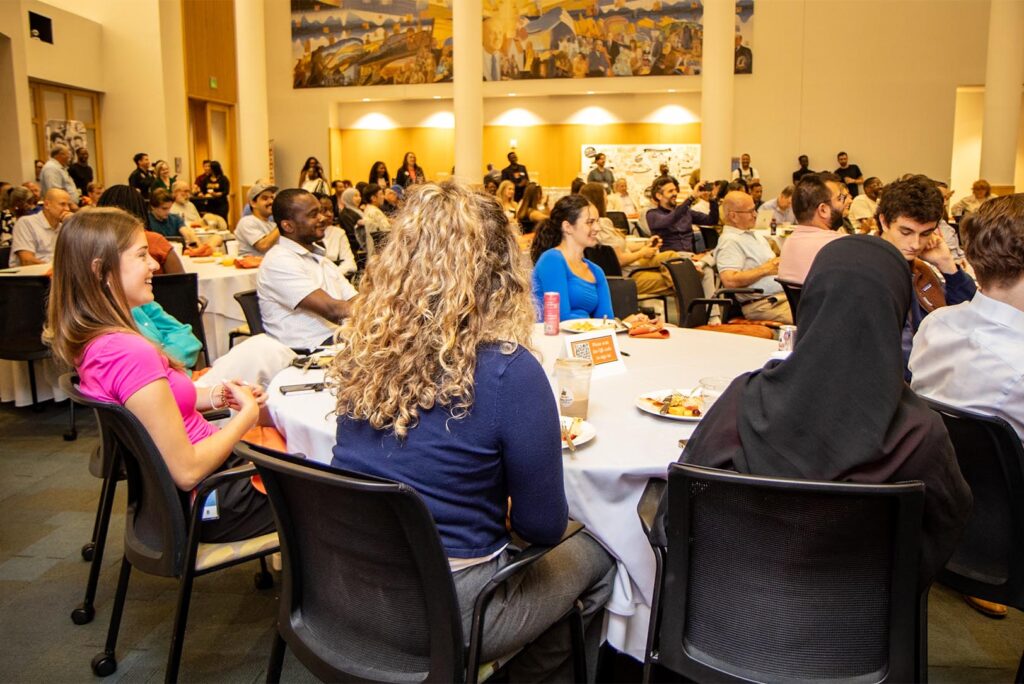
A crowd gathered for 1 Million Cups Kansas City listens during a panel conversation at the Ewing Marion Kauffman Foundation; photo by Haines Eason
Is 1 Million Cups due for a global breakout?
Several panelists said they were inspired by the 1 Million Cups model itself — and expressed interest in adapting it for their home countries.
“This concept — the format, the branding — it’s powerful,” said Malawi’s Wangiwe Joanna Kambuzi, founder of the nonprofit Emerge Livelihoods. “We’d love to see if this could be franchised in Malawi.”
Her country is already experimenting with similar formats, like the Zantchito Entrepreneurship Voices program, supported by the EU and the United Nations Development Programme. But she said continuity — keeping programs alive after initial funding ends — remains the greatest challenge.
“It can’t just be a five-year project,” she said. “We need collaboration across private, public, and development sectors to make it sustainable.”
Haines Eason is the owner of startup content marketing agency Freelance Kansas. Previously he worked as a managing editor for a corporate content marketing team and as a communications professional at KU. His work has appeared in publications like The Guardian, Eater and KANSAS! Magazine among others. Learn about him and Freelance Kansas on LinkedIn.





